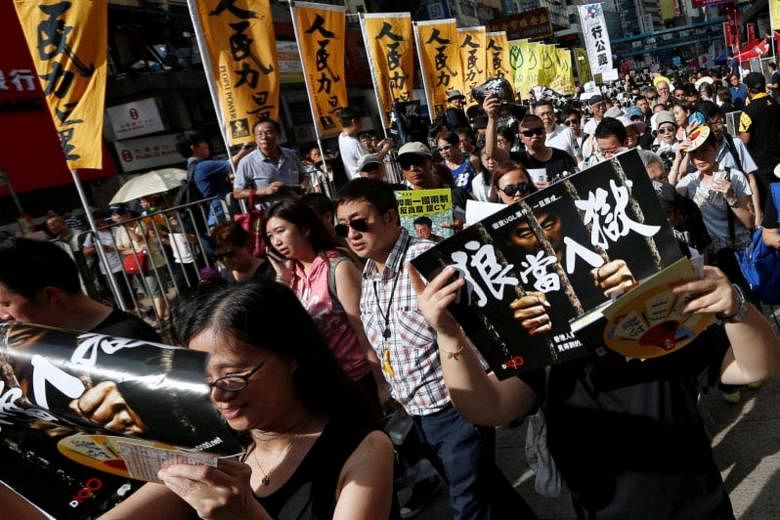HONG KONG - Chinese President Xi Jinping's pledge that the "one country, two systems" principle will continue to be implemented without change may placate the more pragmatic Hong Kongers who see value in having close links with an ascendant China.
But it does little to reassure those seeking to preserve Hong Kong's autonomy and separate identity from the mainland or increase its political freedoms, as events of the past few days have shown.
And while there are Hong Kongers who welcome Mr Xi's visit, there are also some who resent the disruption of people's daily life through the elaborate security arrangements.
The security lockdown, with massive road blocks and cordoning off of areas around the venues that Mr Xi visited, also gave many a sense of separation of the Chinese leader from ordinary people.
One graphic circulating online shows the growing heights of barriers. These were below human height when then president Jiang Zemin visited in 2001 and just above human height when his successor Hu Jintao came here in 2012. During Mr Xi's visit,they were double human height.
"It is like the emperor has come to town," said Ms Polly Chan, 60, a retired church minister.
"Is Hong Kong so dangerous?" she asked, adding it was wasteful to spend huge sums of taxpayers' money to mount the security. About 10,000 or a third of the city's police officers were mobilised.
Ms Chan was at a candlelight vigil on Thursday night for Chinese pro-democracy lawyer and Nobel Laureate Liu Xiaobo. He is on medical parole after being diagnosed with terminal cancer while serving an 11-year jail term for his role in a petition calling for greater democratic freedoms in China.
Many Hong Kongers sympathise with his plight and fear the same fate - of having their freedom of speech curtailed - if they do not push back against what they see as Beijing's tightening grip on the city.
Thus the several protests in the days before and during Mr Xi's three-day visit, which ended today, have included demands for Mr Liu's full release and permission for him to leave the country for medical treatment.
Those who fear encroachment of Hong Kong's autonomy also found issue with Mr Xi's speeches of the past few days.
Said Mr Alan Ng, an educator in his 30s: "He has emphasised 'one country' over 'two systems'."
Mr Ng was at the march on Saturday (July 1) afternoon, a rally to mark the city's handover to China from British colonial rule exactly 20 years ago in 1997. The annual event started in 2003 when half a million people marched in protest against a proposed anti-subversion law they feared would curtail their political freedoms.
As for Mr Ng, he was marching to demand "real universal suffrage" like many other marchers yesterday. He was opposed to the reform framework set out by China's parliament, the National People's Congress, in August 2014 that stipulated that candidates for direct election for the Chief Executive had to be vetted by a Beijing-friendly nominating committee. Pro-democracy Hong Kongers like Mr Ng would like the city's people to be able to nominate their own candidate.
But what could lead to more conflict in Hong Kong in the days to come is Beijing's implacable attitude towards the more radical pro-democracy advocates, particularly those calling for independence.
In his speech at the inaugural ceremony of the new government earlier on Saturday, Mr Xi held out an olive branch to moderate pan-democrats, saying Beijing is prepared to talk to Hong Kongers holding different political views so long as they love their country and Hong Kong and support the "one country, two systems" principle and the city's mini-Constitution.
But he told the new government at a meeting to "strike against and contain independence activities".
With many young Hong Kongers wanting some form of self-determination if not outright independence, conflict over ideology could intensify in the days to come.
Correction note: An earlier version of this article said a candlelight vigil for Nobel laureate Liu Xiaobo was held on Wednesday. It should be Thursday.


